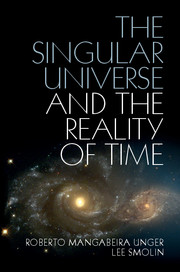Book contents
- Frontmatter
- Contents
- The nature and scope of this work
- Part I Roberto Mangabeira Unger
- Part II Lee Smolin
- 1 Cosmology in crisis
- 2 Principles for a cosmological theory
- 3 The setting: the puzzles of contemporary cosmology
- 4 Hypotheses for a new cosmology
- 5 Mathematics
- 6 Approaches to solving the meta-law dilemma
- 7 Implications of temporal naturalism for the philosophy of mind
- 8 An agenda for science
- 9 Concluding remarks
- Acknowledgments
- References
- A note concerning disagreements between our views
- Index
9 - Concluding remarks
Published online by Cambridge University Press: 05 December 2014
- Frontmatter
- Contents
- The nature and scope of this work
- Part I Roberto Mangabeira Unger
- Part II Lee Smolin
- 1 Cosmology in crisis
- 2 Principles for a cosmological theory
- 3 The setting: the puzzles of contemporary cosmology
- 4 Hypotheses for a new cosmology
- 5 Mathematics
- 6 Approaches to solving the meta-law dilemma
- 7 Implications of temporal naturalism for the philosophy of mind
- 8 An agenda for science
- 9 Concluding remarks
- Acknowledgments
- References
- A note concerning disagreements between our views
- Index
Summary
We close as we opened, with the crisis in cosmology. The growth of untestable scenarios about unobservable multiple universes or extra dimensions are not a cause of the crisis, they are a symptom of the need to change paradigms to avoid stumbling over unanswerable questions, or the proliferation of untestable hypotheses. The great universities and research institutes are full of theoretical physicists who would like to be Albert Einstein, but have no idea how to do it. If so many people of undeniable talent and dedication are unable to make progress, the reason must be in a common mistake, a common shared assumption that is incorrect.
In this book we have aimed to identify the wrong assumptions and conceptual mistakes that are leading cosmology away from the disciplines of science into untestable speculations. They begin with the cosmological fallacy: the mistake of taking a scientific methodology, the Newtonian paradigm, outside of the domain where it can make contact with experiment and observations. The first step in our argument is the understanding that the Newtonian paradigm can only be used in the description of small subsystems of the universe.
- Type
- Chapter
- Information
- The Singular Universe and the Reality of TimeA Proposal in Natural Philosophy, pp. 500 - 501Publisher: Cambridge University PressPrint publication year: 2014

